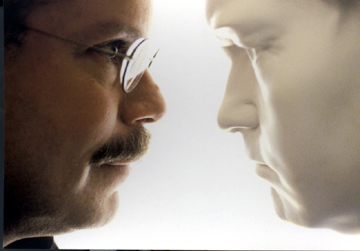|
Web Exclusives: PAWPLUS
Photo: Robert M. Greenberg '76 is Professor of Music at the San Francisco Conservatory of Music, a composer, and a pianist. He is a lecturer on what can only be called a grand scale, known to thousands of listeners and viewers through his audio and video recordings for The Teaching Company. He also holds what may be a unique position as lecturer on music to business organizations: How many other music professors have been profiled in the Wall Street Journal? After graduating from Princeton with a B.A. in music, he earned a Ph.D. in composition at the University of California, Berkeley. The Brooklyn-born Greenberg decided that "The Bay area is as close to Paradise as I'm likely to get," and started teaching adult extension courses at Berkeley. Teaching music appreciation to adults, many of whom had no musical background, Greenberg found himself suddenly, and hugely, popular. "People started asking me to their homes, to give ëliving room courses,'" he says. "Then their friends asked me, too." Among the many students who appreciated Greenberg's lively combination of enlightenment and entertainment was Earl F. Cheit, emeritus dean of Berkeley's Haas School of Business, who alerted the Wall Street Journal to his musical guru. "Music Appreciation for Execs" appeared in the WSJ in 1992, and, says Greenberg, "All of a sudden, a lot of doors opened." He was invited to be featured lecturer for the San Francisco Symphony's Discovery Series, delivering regular lectures related to the symphony programs. The Teaching Company contacted him, to begin work on what became the 48-part "How to Listen to and Understand Great Music," the 32-part "How to Listen to and Understand Opera," and the 32-part "The Symphonies of Beethoven." Subsequent courses on Bach and concert masterworks, and composer biographies, have pushed Greenberg's total number of recorded lectures to well over 300. He began to give lectures for local business groups, teaching music history and appreciation along with leadership technique. "I might, for example, examine the various musical roles played by musicians and their business analogs: the composer (founder), the conductor (CEO), the principal players (management team), and the section players (workforce)," says Greenberg. "By viewing the different roles, the stratification within an orchestra, as a metaphor for those in a business institution, we can gain insight into the sort of leadership and teamwork necessary to create a successful performance—or business." During the course of a talk, his executives hear music by such captains of industry as J.S. Bach, Mozart, Beethoven, Mahler, and Stravinsky. Greenberg continues to speak regularly to the business community, most recently in February at the University of Pennsylvania's Wharton School of Business Advanced Management Program. Greenberg is also a composer, whose works are published by Fallen Leaf Press and recorded on the Innova label. He has composed over 45 works for a variety of instrumental and vocal ensembles. His piano quartet, "Funny Like a Monkey," was performed by the San Francisco Contemporary Music Players at the Yerba Buena Center in February; the San Francisco Chronicle noted his "zesty rhythmic writing," while the San Francisco Contemporary Music Review praised his "contrapuntal skill" and "lush harmonies." "Composing is what brought me to the table," he says. "It's a basic part of what I am and what I've always done." Composing, he says, is "terrible, wonderful fun. If I don't do it, I feel cranky and out of sorts. I like being by myself, sitting at the piano, communing with the fantasy in my own head. For me, writing is an act of self-discovery." Greenberg's current plans include Teaching Company series on Mozart, Verdi, and Wagner operas, as well as biographies of Shostakovich and Schumann. All this means hours of research and hours of writing in his Orinda, Calif., home/studio. There, he is surrounded by "lots and lots of books—I'm only as good as my library—an excellent hi-fi, a Yamaha grand, lots of pencils and music paper (as a composer, I am completely analog), and an HP computer." The actual filming and recording of the lectures, done in the Teaching Company studios in Chantilly, Va., represent only "the very last act in months of hard work." What endears Greenberg to audiences, whether at the San Francisco Symphony, a business seminar, or via cassette player in automobiles across the country, is not only musical expertise, but humor, intense involvement with his subject matter, and insistence on historical context. Defending Puccini's Tosca against critics who call it "trivial," the recorded Greenberg exclaims, "Great composers and great musicologists have trashed Puccini and Tosca. Why, then am I presenting this composer, this opera, to you, my dear friends and listeners? Because—and heaven help my poor, simple soul—I'm crazy about Tosca. The saccharine melodies and melodramatic duets will tear out your heart and stomp on it and make you weep." To critics of Tosca, he cries, "Lighten up! Opera has almost always been a popular entertainment in Italy, so why shouldn't late 19th-early 20th century Italian opera, á la Puccini, be an essentially popular art?" About his unusual career path, Greenberg says, "I'd rather
not have to work quite this hard, but that's a complaint shared
by most of my generation. Everything else is wonderful. Teaching—storytelling—is
a noble thing. And I'd like to think that I'm a natural storyteller."
|

